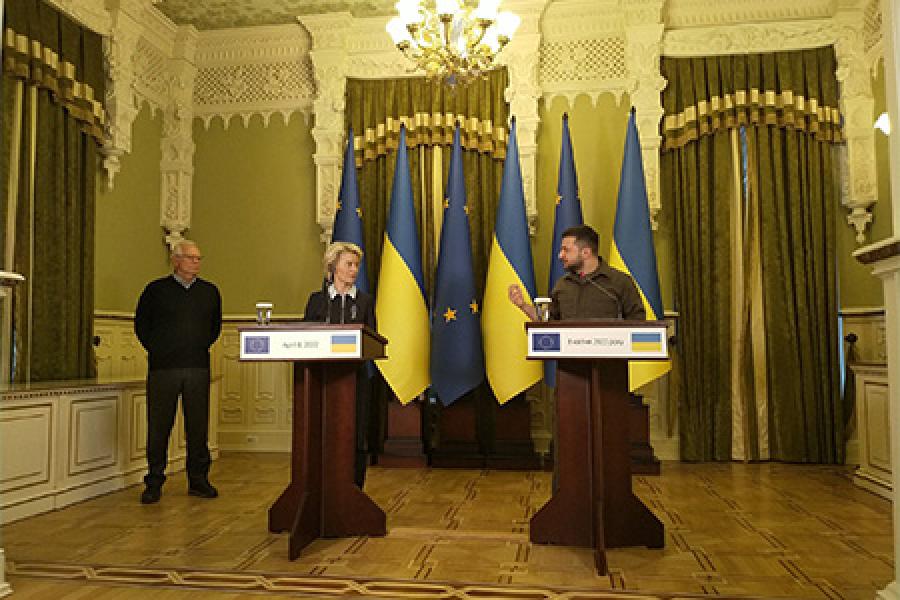European Commission President Ursula von der Leyen visited Kyiv on Friday where she handed-over a questionnaire to Ukraine’s President Volodymyr Zelensky on its application for EU membership.
As already reported, she also visited Bucha outside Kyiv where atrocities were disclosed after the Russian troops had retreated from the town. The images showing bodies of civilians strewn across the streets, many with their hands tied behind their backs, shocked the international community.
After the war has raged on for one and a half month, during which time EU has provided economic, political and military support to Ukraine’s war of defence against Russia’s unprovoked and illegal invasion, EU is also physically back in Ukraine. EU’s foreign policy chief, Josep Borrell announced during the visit, that the head of its delegation is back and that the EU Advisory Mission will also return.
“We stand with you as you defend your country," von der Leyen said. "The Ukrainian people are holding up the torch of freedom for all of us. The European Union is sending weapons to your country."
The handing over of the questionnaire might have come as surprise. When Ukraine submitted its application on 28 February, the EU institutions reacted hesitantly. There is no “fast track procedure” for joining the EU. Article 49 of the Treaty on European Union which establishes how a country can join the EU does not mention it.
At most, the application set in motion a process which will take time, according to the Commission President. While welcoming Ukraine’s membership application, she warned in an interview that there is no getting around the “clear path” set out in the EU’s treaties.
In her speech at the joint press conference on Friday, von der Leyen described the questionnaire as an important step towards EU membership and the basis for discussions in the coming months or even weeks. “We will accelerate the process as much as possible,” she said. President Zelensky replied that Ukraine will be ready with the answers within a week.
Asked by The Brussels Times for a copy of the questionnaire, a Commission spokesperson replied that it was not possible because it is not a public document. Its purpose is to help prepare the Commission’s opinion, as requested by the European Council, on Ukraine’s EU membership application, on the basis of the replies received.
The spokesperson declined to comment on whether the delivery of the questionnaire was a promise of a fast-track procedure in handling Ukraine’s application. Normally this part of the process – from inviting the Commission to draft the opinion and its actual delivery – may last up to one year or longer. The applicant country is usually given a 3-month indicative deadline to complete the questionnaire.
The questionnaire includes thousands of both simple and complex questions aimed at providing precise information about the country. The Commission spokesperson explained that the weeks von der Leyen said it will take referred to the time the Commission needs to prepare its opinion to the Council.
In parallel, the Commission intends to hand-over similar questionnaires to Georgia and Moldova on Monday, according to a tweet by enlargement Commissioner Oliver Varhelyi. “The answers will help the Commission to prepare opinions on the EU applications of the three countries,” he twitted, without mentioning if Ukraine will have priority.
Von der Leyen cautioned at the press conference that the accession process normally takes years and this is also evident judging from the applications of the Western Balkans countries. Asked if Ukraine can join the EU while still at war with Russia, she replied that she is convinced that Ukraine will win the war.
In its forthcoming opinion, the Commission could a best recommend the Council to recognize Ukraine as a candidate country but that does not imply that Ukraine will join the EU any soon. “Ukraine is marching towards a European future,” she said and hinted that the process might be shortened because Ukraine is already closely aligned with the EU.
The need for reconstruction of Ukraine after the war with EU support and funding, after Russia’s destruction of infrastructure and civilian targets, will also determine its path to the EU, von der Leyen added.
A senior Ukrainian official told The Brussels Times that the public authorities have already prepared themselves in filling in an example of a questionnaire in cooperation with NGOs and think tanks. Technical consultations have also been held via video conference on selecting the officials in charge of preparing the replies and filling in the questionnaire.
According to the official, the authorities were told that the Commission intends to finalise its opinion by summer. The Ukrainian authorities plan to fill in the questionnaire already by 24 April. “The Ukrainian government and the public authorities look enthusiastically forward to a fast track to EU membership.”
But what will happen depends not only on Ukraine and the EU but how the war will continue from now after Ukraine has repelled the Russian troops from the Kyiv region. They are currently in the process of regrouping in the eastern and southern regions of Ukraine. Will Russia settle with less than it aimed for when it invaded Ukraine and agree to an immediate cease-fire leading to a political solution?
M. Apelblat
The Brussels Times

